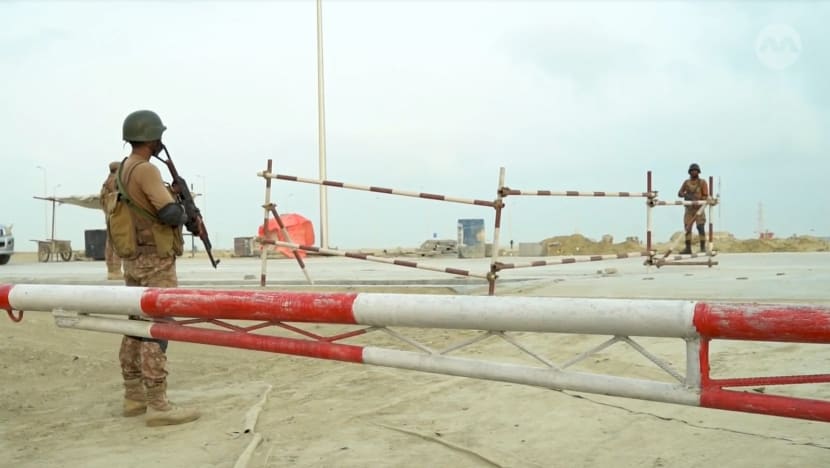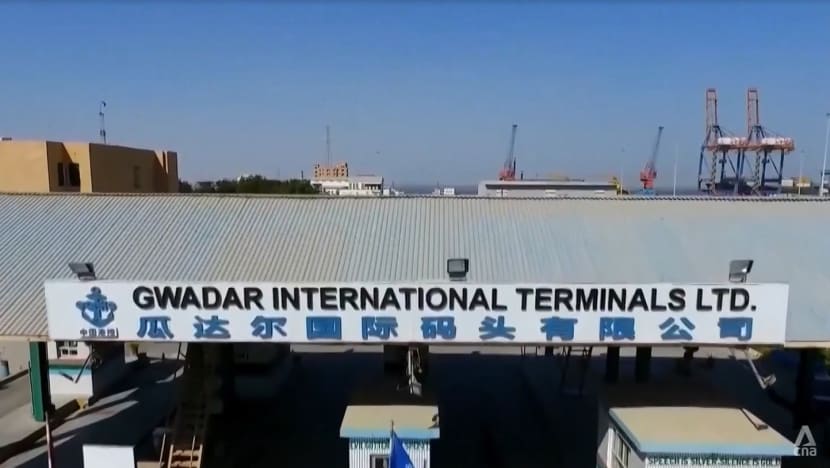China-Pakistan Economic Corridor plagued by security challenges, regional politics and delayed timelines
The flagship project under China’s Belt and Road Initiative has run into a lack of sustained investment, which analysts said is holding back its progress.

Security personnel in Gwadar, Pakistan.

This audio is generated by an AI tool.
GWADAR, Pakistan: The China-Pakistan Economic Corridor (CPEC) was launched to much fanfare almost a decade ago, with US$54 billion worth of infrastructure projects planned.
But security challenges, complex regional politics and delayed timelines have since hit the massive bilateral project, hindering its development.
The flagship project under China’s Belt and Road Initiative is a 2,000km superhighway that begins in China’s Xinjiang province and winds through Pakistan. It ends in Gwadar, a port city on the southwestern coast of Balochistan – Pakistan’s biggest but poorest province.
In recent months, Beijing has called for greater security measures for its citizens in Pakistan amid an increase in terrorist attacks in the South Asian nation since 2022.
Analysts said a lack of sustained investment in the CPEC is holding back progress, with one key reason being the security concerns looming over Gwadar Port and other CPEC projects.
INVESTORS HITTING THE BRAKES
In March, suicide bombers targeted a convoy of Chinese engineers in northwest Pakistan near the border with Afghanistan, killing six people. It was the third major attack on Chinese interests in Pakistan in a week.
Attacks by Baloch separatists have become more frequent in the region as well, though the Pakistan Army has denied any direct attacks on Chinese projects or interests in Gwadar.
"The misplaced perception that foreign investors aim to deprive the Baloch people of local natural resources through projects like CPEC is the primary motive behind this threat,” Brigadier Ihtasham Sarwar told CNA.
“This perception is primarily fuelled externally by all those elements who are wary of the potential that this project has.”
These security fears have prompted Chinese investors to hit the brakes on projects.
In a recent visit to Pakistan, senior Chinese diplomat Liu Jianchao, minister for international liaison in China’s Communist Party, said such threats are the main hazards to CPEC cooperation.
Related:
MEASURES TO PROTECT CHINESE CITIZENS
For Pakistan, relations with China – a key investor and ally – are vital.
The country is also struggling for political and economic stability after a prolonged period of internal turmoil, sparked by the ousting of former prime minister Imran Khan.
It has since rolled out new security measures in efforts to protect Chinese citizens.
A special force of more than 11,000 security personnel dedicated to the security of CPEC projects now also looks after non-CPEC projects, said Ahsan Iqbal, Pakistan’s Minister for Planning, Development and Reform.
“We have also enhanced the security protocols which involve our police, civil armed forces and we are making very extensive security cover of the areas where Chinese are working,” he told CNA.
Meanwhile, the military has stepped up security for Chinese workers building the Gwadar International Airport, while the government has launched a national counterterrorism operation to address wider security problems.
Iqbal noted that the operation is “largely intelligence-based” and will neither target a large section of the population nor displace people from their villages or residences.
Related:
RECENT PROTESTS
In June, Pakistani Prime Minister Shehbaz Sharif travelled to Beijing with a high-level delegation for a five-day visit, where he sought to assure the Chinese government of Pakistan’s commitment to provide security for CPEC projects.
Both countries then announced plans to upgrade the CPEC and set the second phase in motion.
But more recently, protests have erupted in Balochistan, including in Gwadar, over alleged human rights violations and resource exploitation.
This prompted Chinese Consul General Yang Yundong last week to urge Pakistan’s provincial and federal governments to listen to the protestors’ concerns, and work on a positive solution to end the deadlock.

EXPERTS OPTIMISTIC THAT SITUATION WILL IMPROVE
Analysts said an improvement in security should soothe fears over the viability of Gwadar Port and other CPEC projects, as well as encourage a return of much-needed investment.
The development of Gwadar, which aims to uplift impoverished communities in Gwadar and bring new prosperity to the region, has changed the sleepy town in recent years.
Among the town’s new infrastructure is the China-Pakistan Friendship Hospital. Inaugurated in December last year, it has brought an end to long trips to Pakistan’s largest city Karachi for medical treatment.
Aside from that, Gwadar Port – located in southern Balochistan province – is now the only port in the country capable of handling large vessels.
The idea behind the port, which was developed by Chinese engineers and financed by the Chinese government, was ambitious: To build a deep-sea port that would give China and Pakistan access to Central Asia, South Asia and the Middle East in one go.
But the port has seen a slow start since it opened in 2018, with local businesses telling CNA that it still needs to develop better last mile connectivity.
Experts expressed optimism that the situation will get better.
"It will take time to get it to full potential like any other business,” said political economist Shakeel Ahmad Ramay from the Asian Institute of Eco-civilization Research and Development.
“Many countries have shown interest and they are signing agreements with Pakistan and they are also showing interest to invest in Gwadar,” he added.















